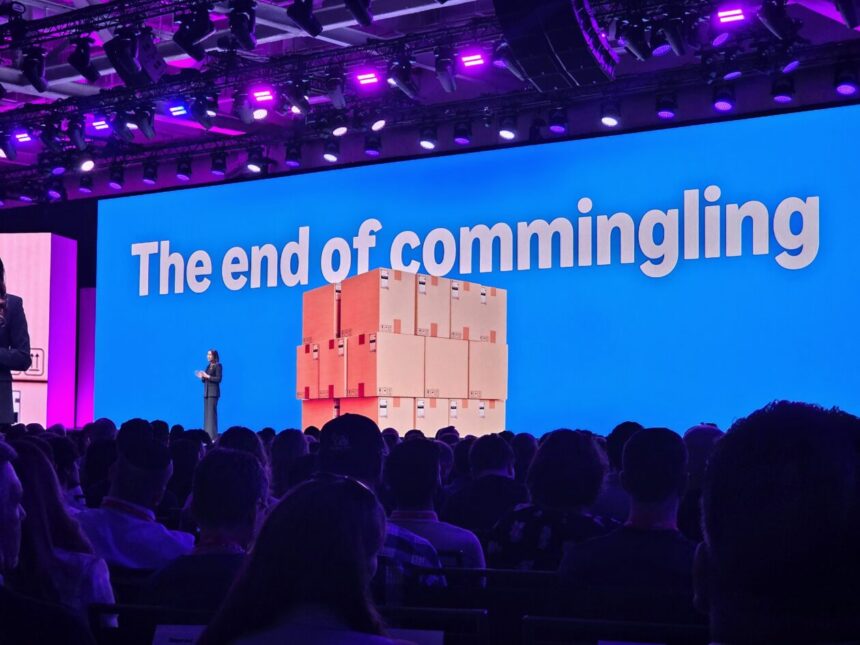Amazon made a series of big announcements Wednesday at its annual Accelerate conference for sellers — including new AI tools that could significantly reduce their manual workload.
Yet the biggest applause came not for artificial intelligence, but for an old-fashioned logistics change: a promise to end “commingling,” a behind-the-scenes inventory practice that has drawn criticism from brands and sellers for more than a decade.
For most people, the term might evoke shared finances. But in Amazon’s world, commingling means pooling identical items from different sellers under a single manufacturer barcode — then shipping whichever unit is closest to the customer, regardless of who supplied it.
The benefits include speeding up deliveries, making more efficient use of warehouse space, and saving money and effort for sellers. But the downsides include the risk of mixing authentic products with counterfeit, damaged, expired, or dangerous ones from less reputable sellers.
Over the years, commingling has led to some high-profile fallout from brands concerned about product quality and customer trust.
- Johnson & Johnson temporarily pulled many of its consumer products from Amazon in 2013 due to concerns over expired or damaged goods supplied by third-party sellers.
- The kitchenware brand Tovolo saw knockoffs rise in search results when it slowed shipments to Amazon, exposing how counterfeiters could exploit the commingled inventory system, as reported by the Wall Street Journal in 2014.
- German knife maker Wüsthof and audio company Bose also restricted fulfillment through Amazon to prevent their goods from being mixed with unauthorized or imitation products.
To avoid commingling, sellers have long had the option to apply a unique, seller-specific Amazon barcode — known as an FNSKU (Fulfillment Network Stock Keeping Unit) — to every product. This ensures their inventory is tracked and shipped separately.
But this “re-stickering,” as it’s known, is costly and time-consuming solution. Sellers had to print the FNSKU labels and apply them to all their items before shipping them to Amazon, or pay Amazon a per-item fee to do it for them. Amazon estimates that brand owners spent $600 million in the past year alone to avoid having their products commingled.
Dharmesh Mehta, Amazon’s vice president of selling partner services, said in an interview that he had been looking to end commingling for many years.
Driving the decision was a cost-benefit analysis of the supply chain. For years, the overall cost savings and increased sales that sellers received from the ability to speed up shipments outweighed the cost that other sellers incurred for stickering their products to opt out.
That balance has now shifted. Mehta explained that a few major changes tipped the scales.
- Amazon’s logistics network has become more effective at placing inventory close to customers, reducing the need for pooled inventory to speed up delivery.
- More sellers are now brand owners, which disproportionately opt out of commingling to protect product quality.
- Amazon’s systems can now virtually track individual units throughout the network. That means Amazon can trace and route a seller’s specific product, without needing to mix it with inventory from others.
So with the original advantages no longer outweighing the downsides, commingling no longer made sense. And with that, it will soon be a thing of the past.
Nadya Dhalla, director of Supply Chain by Amazon, announced on stage Wednesday morning that commingling will be phased out across its supply chain later this year.
The change means that when customers buy from a seller, they will receive a product that the specific seller supplied, and any returns will come from that same inventory.
For brands, it eliminates the expensive workaround of re-stickering and provides newfound flexibility to manage a single pool of inventory across multiple sales channels.
As reported by ModernRetail Daily, industry analysts are already calling the move one of the most significant steps Amazon has taken in years to help protect brands on its platform.
Read the full article here










